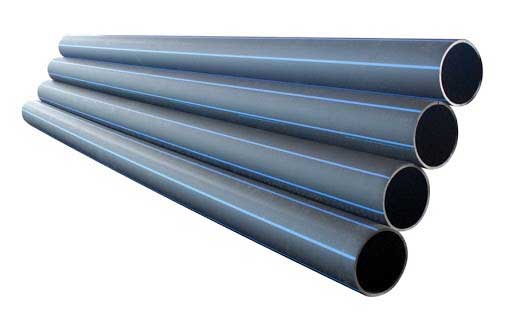American Plastics HDPE Pipe for Oilfield: Built for Harsh Conditions
Wiki Article
Comprehending the Trick Conveniences of HDPE Pipeline for Water and Wastewater Administration
The use of HDPE pipe in water and wastewater management offers many advantages that merit factor to consider. Its remarkable toughness and lengthy lifespan make it a preferred option for numerous jobs. In addition, the product's resistance to deterioration and chemical damages boosts its dependability in different environments. Nevertheless, the benefits expand beyond simply durability and resistance. Exploring its cost-effectiveness and ecological impact exposes also much more compelling reasons for its widespread adoption in modern facilitiesExtraordinary Resilience and Long Life

HDPE pipe stands apart for its outstanding longevity and longevity, making it a favored selection in water management systems. Built from high-density polyethylene, these pipes can stand up to significant stress and stress and anxiety, guaranteeing trustworthy efficiency with time. Their robust nature enables them to sustain extreme ecological problems, consisting of temperature variations and soil activities, which can create other products to fall short.
The life-span of HDPE pipelines usually surpasses half a century, providing an economical solution for districts and markets alike. Furthermore, the material's light-weight properties streamline installation, minimizing labor expenses and durations. This durability decreases the requirement for constant repair services or substitutes, additionally enhancing its financial allure.
In water management applications, the reliability of HDPE pipes suggests less interruptions and enhanced solution connection, making them indispensable to sustainable infrastructure growth. The mix of durability and long life strengthens HDPE's role as a keystone in reliable water management options.

Resistance to Corrosion and Chemical Damage
While numerous materials give in to corrosion and chemical damage with time, HDPE pipes display remarkable resistance, making them suitable for various water administration applications. This resilience stems from the molecular framework of high-density polyethylene, which is naturally non-reactive and does not corrode like metals or deteriorate from direct exposure to harsh chemicals. As an outcome, HDPE is extremely efficient in environments with aggressive substances, such as wastewater systems that might have acids, bases, and natural solvents.
Furthermore, HDPE pipelines can withstand environmental factors such as soil level of acidity and saline conditions, even more enhancing their viability for diverse applications (American Plastics HDPE Pipe Manufacturing). Their capacity to preserve structural stability with time decreases the danger of leakages and failings, which is crucial in ensuring the safety and dependability of water distribution and wastewater administration systems. As a result, the resistance to deterioration and chemical damages considerably adds to the overall performance and durability of HDPE piping options
Cost-Effectiveness and Economic Advantages
When thinking about the financial effects of water administration systems, the cost-effectiveness of HDPE pipelines becomes evident. These pipes use reduced installation and maintenance prices contrasted to conventional products like steel or concrete. Their light-weight nature simplifies transportation and installation, leading to minimized labor expenses. Furthermore, HDPE pipelines show a long lifespan, typically going beyond half a century, discover this which converts to less substitutes and lasting savings.Moreover, the resistance of HDPE to corrosion and chemical damages lessens the demand for expensive repair services and replacements. The pipes additionally support effective water circulation, minimizing power expenses associated with pumping systems. By mitigating leakages and water loss, HDPE pipes add to considerable financial advantages for municipalities and sectors alike. Generally, the preliminary Read More Here financial investment in HDPE piping can yield significant economic returns over the life-span of the water management system, making it a prudent choice for lasting facilities development.
Environmental Sustainability and Lowered Influence

Versatility and Adaptability in Setup
Since of their distinct buildings, HDPE pipelines use remarkable convenience and versatility in installation, making them ideal for a vast array of applications. Their lightweight nature enables simpler handling and transport, lowering labor prices and installation time. HDPE pipes can be bent and shaped to fit different surfaces and job needs, which is especially useful in testing environments.Additionally, their resistance to deterioration and chemical damages enables installation in diverse settings without the need for specialized protective layers. The capacity to fuse joints produces a continuous, leak-free system, improving the total stability and reliability of the installation. HDPE's flexibility likewise fits ground motion, decreasing the risk of damage in locations susceptible to changing soil. Generally, these characteristics make HDPE pipes not only flexible but additionally you could try here a preferred choice for water and wastewater monitoring systems.
Often Asked Inquiries
How Does HDPE Pipeline Compare to PVC in Water Management Applications?
HDPE pipeline provides premium adaptability, resistance to deterioration, and sturdiness compared to PVC. Its lighter weight promotes much easier installment, while its lengthy lifespan lowers substitute expenses, making HDPE a favored selection in water monitoring applications.What Is the Life Expectancy of HDPE Pipeline Under Normal Conditions?
Under normal conditions, HDPE pipes can have a life-span varying from 50 to 100 years. Their toughness and resistance to rust contribute to their long-lasting efficiency in numerous applications, making them a dependable selection for facilities.Are HDPE Piping Recyclable After Their Life Span?
Yes, HDPE pipelines are recyclable after their life span. Pipe Supplier American Plastics Midland. They can be refined and repurposed into new items, significantly reducing ecological effect and promoting sustainability within the market, making them an eco-friendly choice for piping optionsWhat Is the Installment Process for HDPE Pipeline?
The installation procedure for HDPE pipes involves website prep work, trenching, pipeline blend or mechanical joining, backfilling, and pressure testing. Correct methods guarantee a sturdy and reliable system for delivering water and wastewater successfully.Can HDPE Pipes Be Made Use Of for Both Drinkable and Non-Potable Water Systems?
Yes, HDPE pipes can be used for both potable and non-potable water systems. Their adaptability, durability, and resistance to rust make them appropriate for different applications, making sure risk-free and reliable transport of water in different contexts.Report this wiki page